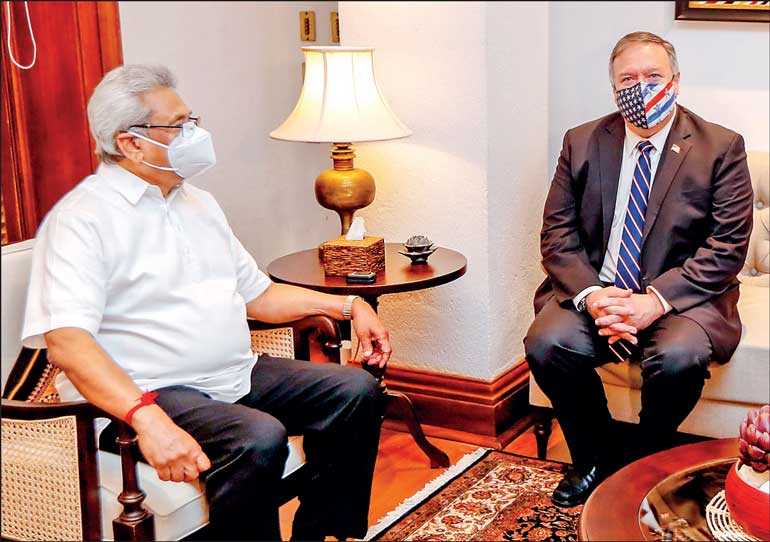Monday Feb 16, 2026
Monday Feb 16, 2026
Friday, 6 November 2020 00:15 - - {{hitsCtrl.values.hits}}

President GR’s response to Pompeo’s appeal and warning (if GR’s media division’s communique is to be believed) that he would “not compromise the independence, sovereignty and territorial integrity of the nation when it comes to foreign policy”, should be considered more as braggadocio to satisfy his domestic electorate than a genuine reflection of reality
“We have no eternal allies, and we have no perpetual enemies. Our interests are eternal and perpetual, and those interests it is our duty to follow” – Lord Palmerston.
“Whatever policy you may lay down, the art of conducting the foreign affairs of a country lies in finding out what is most advantageous to the country. We may talk about international good will and mean what we say. But in the ultimate analysis, a government functions for the good of the country it governs and no government dare do anything which in the short or long run is manifestly to the disadvantage of that country” – Jawaharlal Nehru.
Pompeo may or may not remain US Secretary of State after the election. Yet, when he warned Sri Lanka about aligning too much towards ‘predator’ China, he was doing so not only on behalf of his President but more importantly on behalf of the country’s military-industrial-financial-congress complex that ultimately sets the basic parameters of US foreign policy.
Whether the Republicans or Democrats who conquer the White House, US-China confrontation is not going to fade away, and with India as a staunch, the current cold war between the two powers may even turn hot quite accidentally if not by design.
With the Indian Ocean as the central theatre of action, Sri Lanka, whether it remains neutral or not, cannot escape getting caught in the crossfire. Given this scenario, does non-alignment or neutrality make any sense in Sri Lanka’s foreign policy? Alternatively, can the country afford to be choosy in the face of its gloomy economic reality? This is the sad predicament in to which the country has been pushed into.
Non-alignment
Non-alignment had its usefulness in 20th century bipolar world. During that period several Third World countries remained non-aligned as a bloc, and Indian and Sri Lankan were in the Soviet camp. At that time, Indian Ocean was not a zone of conflict, and China was in the periphery.
That was an era when Sri Lanka had the best opportunity to build the nation and turn it into an economic power house like Singapore. Had it done so, the country would have been a strong to pick and choose its international friends, keep its foes at bay and set its own terms and conditions for its friendship. The dream was there but not the capacity and foresight to make it a reality.
However, the non-alignment strategy was flouted already during Mahinda Rajapaksa’s presidency when its foreign policy was singularly focused in winning the war. It was the financial cost incurred to win that war that led to his pro-China policy, which has now become a bone of contention with India and US.
President’s stance
Given this background, President GR’s response to Pompeo’s appeal and warning (if GR’s media division’s communique is to be believed) that he would “not compromise the independence, sovereignty and territorial integrity of the nation when it comes to foreign policy”, should be considered more as braggadocio to satisfy his domestic electorate than a genuine reflection of reality.
GR’s assurance to his Cabinet mavericks that he would not sign the MCC agreement even in a dream should also be treated in that spirit. Unless some details leak out of the secret talk that took place between him and Pompeo behind closed doors, we will not know what the President actually promised and undertook to pursue.
Whether the US is a friend or a bully, or, China a protector or a predator, the primary aim of both powers, and of India for that matter, is to promote their own interests at the expense of Sri Lanka. Likewise, Sri Lanka’s foreign policy should also be designed to advance its own interest at the expense of those three. This is a tall order for a small and economically impoverished nation that is strategically situated along one of the busiest trade routes in the world.
Economic revival
At the moment there is no other interest more immediate to Sri Lanka than the need to revive its economy hit not only by the pandemic driven global depression, but even before that by the unbearable cost of the civil war. In fact, most of today’s economic ills of the nation could be traced back to that war, which our pundits seem quite reluctant to talk about, because the man who conducted that war is seated at the top of the realm.
Be that as it may, while economists are speculating about the geometric shape of the revival, whether it will be U-shaped, V-shaped or W-shaped, World Bank has already downgraded the country’s economic status from High-Middle Income to Low-Middle Income, and the international credit monitoring agency Moody’s has pushed Sri Lanka’s rating down by three notches from B2 to Caa1. With the latest wave of the pandemic, the economy continues spiraling downwards. The push for a moratorium on or re-profiling the nation’s debt shows how desperate the economic situation is.
With almost 100% debt-GDP ratio, falling public revenue and increasing budget deficits, shrinking foreign reserves, a depreciating currency and high inflation the economy is virtually on life support with help from friendly countries and international institutions. While the Central Bank expects the country’s GDP to drop by 1.7% this year, which is totally unrealistic, the World Bank estimates the economy to shrink by 6.7%, and IMF by 4.6%.
Amidst all speculation about future growth and estimations about current performance, the reality of the situation is reflected best in millions of ordinary households where consumers are struggling to eke out a living with insufficient income, supply shortages and rising prices.
The country suffers from an Acute Income Deficiency Syndrome (AIDS), both at public and private levels, which naturally increases public and private debt. This debt burden is a curse inherited mostly from the civil war and will continue to suffocate the economy for years to come, unless some miracle happens to save the country.
Caught in the middle
When a country is economically and financially dependent and caught at the same time in the whirlpool of super power cold and hot war pressures, what sense does it make when its President announces neutrality in foreign policy? When elephants make love or when they fight, it is the innocent grass that gets trampled. Sri Lanka is not an innocent victim but became one because of political blunders.
Is there a way out of this predicament? If there is will there is a way and it has to come from the economy, through reducing its financial dependence on foreign sources. This is not to argue for a closed economy, but for an economy that produces surplus over several years, accumulates enough savings and settles the debt.
It is long and painful path and there is nothing new about this. Every successful economy has trodden this path. But in Sri Lanka, with all its natural resources and human skill, it is the failure to manage the country’s pluralism that has prevented its economy from generating a surplus. There is no escape from this fact.
Exclusivist and hegemonic intentions
Fundamentally, Sri Lankan rulers since independence considered the country’s plural make up more as a curse than a blessing that could be harnessed for nation building and economic development. It was that attitude which brought the civil war and since then that attitude has solidified into an ideology. The current Jathika Chintanaya or national ideology is a product of that attitude and is acting as a bulwark against any collective effort towards development.
This ideology which has a decisive influence over policies and actions of the ruling regime is essentially an exclusivist philosophy that dismisses the need and role of minorities in nation building and economic development. It is intentionally designed to be both exclusivist and hegemonic, and it is the one that worked behind the scene to introduce the constitutional changes adopted recently.
The exclusivist and hegemonic intentions of the ideologues were clearly demonstrated when they demanded that those carpetbaggers from the Muslim minority who voted for the amendments and helped those amendments passed through the Legislature should neither be accommodated into the government ranks nor be rewarded with new positions.
These ideologues openly argued their case in the name of Sinhalese unity and Buddhist hegemony. Theirs is a dangerous exercise in othering the minorities to make communal disunity permanent and economic development sectarian. The need of the time is for an inclusive ideology that would unite the country in its struggle for economic revival.
Sri Lanka enjoyed prosperity and splendour in the past by nourishing its pluralism and it will suffer in misery and dullness by starving it. While economic difficulties are mounting and society remains divided and discontented, the country obviously falls vulnerable to foreign power manipulations. Given this reality, GR’s so-called neutrality in foreign policy is just rhetoric for public consumption.
(The writer is attached to the School of Business & Governance, Murdoch University, Western Australia.)